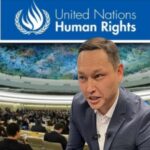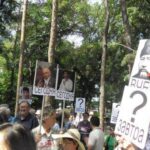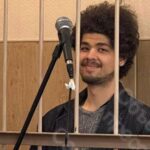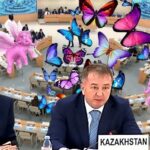Oslo, Brussels, The Hague 20 March 2012. With negotiations on a new EU-Kazakhstan cooperation agreement about to enter a new phase, the Norwegian Helsinki Committee (NorHC), International Partnership for Human Rights (IPHR) and the Netherlands Helsinki Committee (NethHC) appeal to the EU to use this agreement as an opportunity to push for concrete democracy and human rights progress in the Central Asian country. The EU should make clear to the Kazakhstani government that a deepened relationship requires decisive measures to reverse the negative trend in human rights protection that recently has been seen in the country, as well as constructive reforms to deliver on human rights commitments and promises.
Negotiations to replace the 1999 EU-Kazakhstan Partnership and Cooperation Agreement (PCA) with a new, enhanced agreement were launched in 2011. A series of meetings on the matter have been scheduled for this and coming months. According to a statement delivered on behalf of EU High Representative for Foreign Affairs Catherine Ashton on 14 March 2012, “strengthening EU-Kazakhstan relations does not – and cannot – occur independently from the progress of political reforms in Kazakhstan.” The statement also said that “success” of the negotiations on the new PCA “will be influenced by” the advancement of reforms in Kazakhstan and that the EU foresees to “motivate progress” by including “reform commitments” and human rights clauses in the new agreement. A resolution adopted by the European Parliament on 15 March 2012 similarly emphasized that progress in the PCA negotiations “must depend on” the progress of political reforms in Kazakhstan and called on this country to “maintain its declared commitment to further reforms” with respect to democracy, human rights and the rule of law.
The NorHC, IPHR and the NethHC welcome the principled position taken by the EU with respect to linking the negotiation and enforcement of the new EU-Kazakhstan PCA to human rights progress made by Kazakhstan. The three organizations call on the EU to follow up on this position by elaborating concrete and specific benchmarks for human rights improvements that the Kazakhstani authorities should be expected to carry out as a condition for the adoption and execution of the PCA. It would also be essential that the PCA contains clear and strong provisions that set out that progress on democracy, human rights and rule of law is an integral part of the agreement and make continued implementation of the agreement contingent on the fulfillment of human rights criteria. The objective should be to hold the Kazakhstani government accountable to international human rights standards, recommendations made by international human rights bodies overseeing compliance with such standards, as well as the government’s own reform promises.
When Kazakhstan was granted the OSCE chairmanship in 2010, there were hopes that this would boost human rights in the country. As part of its chairmanship bid, the Kazakhstani government pledged to liberalize legislation on media, elections and political parties (in the so-called 2007 Madrid commitments). Later it committed itself to continuing to make “steady” progress, including by implementing the 2009-2012 National Human Rights Action Plan in “close cooperation” with “civil society groups as well as foreign government and non-government actors.” However, while the Kazakhstani authorities have taken some limited reform steps in the last few years, the impact of these have been outweighed by other repressive measures. As a result, there has beeen no meaningful overall progress on human rights protection in the country. Moreover, in recent months, the human rights situation has deteriorated further, a trend which the EU High Representative for Foreign Affairs and the European Parliament also noted with concern last week.
In view of the above, the NorHC, IPHR and the NethHC believe that the EU will be able to more effectively promote human rights reforms in Kazakhstan as part of the PCA negotiation and enforcement process if it pursues concrete and measurable benchmarks for progress rather than a more general strategy. The three organizations also believe that such an approach would be consistent with the policy of human rights conditionality advocated by the EU in relations to third parties, while at the same time supporting Kazakhstan’s democratic aspirations and beneficially influencing future EU-Kazakhstan relations.
****
Key areas of concern in Kazakhstan, where it would be important that the EU would elaborate and pursue benchmarks for progress:
Ø Political participation
The Kazakhstani authorities have made some changes to its legislation on elections and political parties since pledging reforms in this area in the Madrid commitments. However, as concluded by OSCE and Council of Europe monitors, the legal framework for political participation still remains inconsistent with international standards and the January 2012 parliamentary elections were not genuinely pluralistic or democratic. Even if the elections formally ended the monopoly in parliament of the pro-presidential party, the two other parties that gained representation are also both loyal to the current regime. The country’s two major opposition parties were not able to run as one was suspended by court on spurious grounds, and the other one has not been granted registration despite seeking it for a long time.
Ø Investigation of the December 2011 tragic events in the city of Zhanaozen
During these events, more than a dozen people died and some 100 were wounded as police used arms to put down riots. Immediately afterwards, President Nazarbaev ordered that the events be investigated in a thorough and transparent way, ”if need be” with the involvement of independent experts. The EU has supported this call, emphasizing the importance of ensuring “full respect for human rights.” While the events are still being investigated, there are concerns about the conduct of these efforts. The Kazakhstani authorities have acknowledged that the response to the riots was excessive and initiated criminal cases against a number of law enforcement officials. However, the authorities have not made public full details of all cases of deaths and injuries or announced any measures to bring to justice higher-ranking officials who gave orders about the use of force. Allegations of torture of individuals detained on suspicion of involvement in the riots, as well as intimidation of them and their family members have also yet to be investigated. With trials against those charged with organizing or participating in the riots expected to start on 27 March 2012, there are imminent concerns as to the fairness of these proceedings.
Ø Ongoing crackdown on labor activists, political opposition members and opposition journalists
The EU and other international actors have expressed concern about the “clampdown on opposition” that has taken place in Kazakhstan following the Zhanaozen events. Labor activists involved in the months-long peaceful strike that preceded the Zhanaozen events, as well as opposition members and journalists supporting the workers in their struggle have been interrogated, detained and criminally charged on questionable grounds. These developments have reinforced a pre-existing pattern of harassment.
It was welcome that Igor Viniavskii, chief editor of the opposition Vzgliad newspaper who had been held in for custody since January 2012, was amnestied and released on 15 March 2012. He had been charged with calling for the overthrow of the constitutional order after being apprehended in a anti-opposition raid conducted by security services after the Zhanaozen events. Likewise it was a relief that Natalia Sokolova, a lawyer advising striking oil workers who was imprisoned for six years in August 2011 for “inciting social hatred” and conducting “illegal” assemblies, was released from prison on 8 March 2012. However, while her sentence was reduced to a three-year suspended one by the Kazakhstani Supreme Court, it is regrettable that she was not acquitted and that a ban on engaging in “public” activities was upheld against her. Also, it is of serious concern that what appears to be politically motivated criminal charges against a number of other labor movement representatives and political opposition members remain pending.
Ø Media freedoms
In its Madrid commitments and the Human Rights Action Plan, the Kazakhstani government set out to reform the media environment in accordance with international human rights standards and recommendations. However, the limited liberal legal reforms that have been made have failed to bring about any real improvements, and other new legislation has aggravated existing concerns. Among others, new legislation from early 2012 provides for enhanced government control of electronic media. Efforts to control and restrict the spread of independent information on the internet have also been stepped up and, in particular, opposition media have come under growing pressure because of criminal and administrative charges, civil defamation suits involving excessive claims for damages, and intimidation and obstruction of the work of journalists.
Ø Peaceful assembly
The Human Rights Action Plan states that new legislation protecting the right to freedom of assembly will be developed in consultation with civil society, but this objective has yet to be realized. Existing legislation and practice in this area are highly problematic and have been criticized, among others, by the UN Human Rights Committee. The authorities often deny or restrict the right of political and civil society activists who are critical of the government to hold assemblies and disperse and punish the participants in “unsanctioned” peaceful protests. There have been new cases in the first part of 2012 when participants in peaceful opposition protests have been intimidated by heavy police presence, dispersed, detained and sentenced by court to fines or administrative arrests. Among others, such measures targeted the participants in two large-scale actions that were held in Almaty on 28 January and 25 February 2012 to protest the results of the parliamentary elections, post-Zhanaozen developments and the arrests of political opponents.
Ø Freedom of religion
With the adoption of the 2009-2012 Human Rights Action Plan, the Kazakhstani authorities undertook to elaborate new legislation guaranteeing freedom of religion. However, the new Religion Law that entered into force in October 2011 retained the ban on activities by unregistered religious communities and introduced new far-reaching restrictions on religious practice. It was adopted without any real public consultation and failed to take into account recommendations of international human rights bodies and NGOs. The implementation of the new law has resulted in increasing harassment of so-called non-traditional religious communities, such as independent Muslim communities and Protestant communities. Small religious minority groups have reportedly been pressured to stop their activities, even if the new law gives them one year to re-register in accordance with new requirements. From early 2011 to early 2012, close to 600 registered religious groups were closed down.
For more information about recent human rights concerns in Kazakhstan, see:
Briefing paper by the NorHC, “EU should insist on respect for human rights as part of its PCA negotiations,” March 2012, http://www.nhc.no
Report by IPHR, NethHC and partners, A sobering reality: Fundamental freedoms in Kazakhstan, Turkmenistan and Uzbekistan twenty years after the Soviet collapse, March 2012, at
http://www.iphronline.org/uploads/9/0/2/7/9027585/central_asia_report_march_2012.pdf
















